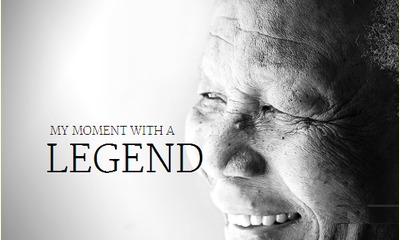|
|
Mandela archive goes live on the web
un article par www.nelsonmandela.org
Video: Nelson Mandela: My Moment with a Legend
Google and the Nelson Mandela Centre of Memory (NMCM) have announced that the new Nelson Mandela Digital Archive is now live on the web, freely accessible to the global public.

click on photo to enlarge
Google gave a $1.25m [R8.6million] grant to the Johannesburg-based NMCM in 2011 to help preserve and digitise thousands of archival documents, photographs and videos about Mr Mandela. And now the digital exhibition has become a reality.
Along with historians, educationalists, researchers and activists, users from around the world now have access to extensive information about the life and legacy of this extraordinary African statesman.
The new online multimedia archive includes Mr Mandela’s correspondence with family, comrades and friends, diaries written during his 27 years of imprisonment, and notes he made while leading the negotiations that ended apartheid in South Africa. The archive will also include the earliest-known photograph of Mr. Mandela, rare images of his cell on Robben Island in the 1970s, and never-seen drafts of Mr Mandela's manuscripts for the sequel to his autobiography Long Walk to Freedom.
“It is invigorating to see our combined efforts become a reality,” said Verne Harris from the Nelson Mandela Centre of Memory. “This digital initiative will make it possible for us to reach the full spectrum of our stakeholders, from the global elite to systemically disadvantaged South Africans. Visitors can search and browse the archives to explore different parts of Mr Mandela’s life and work in depth: Early Life, Prison Years, Presidential Years, Retirement, Books for Mandela, Young People, and My Moments with a Legend.”
Steve Crossan, Director of the Google Cultural Institute, said: “The Mandela Digital Archive Project shows how the Internet can help preserve historical heritage and make it available to the world. We’ve worked closely with the NMCM to create an interactive online experience with powerful search and browsing tools, so that users can explore Mr Mandela’s inspiring life story.”
“The Archive currently includes over 1 900 unique images, documents and videos, and will grow over time,” said Luke Mckend, Country Manager for Google South Africa.
“South Africans from all walks of life can now engage with important parts of our country’s history. For example, reading handwritten pages of a letter smuggled from Robben Island in 1977, or seeing warrant documents that sent Mr Mandela to jail, first for five years and then for life.”
The Nelson Mandela Digital Archive project is an initiative by the Nelson Mandela Centre of Memory and the Google Cultural Institute. With a team of dedicated Googlers around the world, the Cultural Institute builds tools to preserve cultural heritage and make it accessible worldwide. Other projects include showcasing the Dead Sea Scrolls, presenting thousands of works of art online through the Art Project, and the digitisation of the the Yad Vashem Holocaust materials.
To start exploring the Nelson Mandela archive visit: http://archive.nelsonmandela.org.
|








|
DISCUSSION
Question(s) liée(s) à cet article:
The truth about our history, Why does it matter to our present and our future?
* * * * *
Commentaire le plus récent:
The following is excerpted from an article by Ernesto Semán, professor at the University of Richmond in the U.S. He looks at the recent torture report to the U.S. Senate in the light of the history of U.S. implication in the torture that took place in previous decades in Latin America. As he points out, the torture is only the most recent expression of American policies that amount to a form of state terrorism.
. . . instead of accepting the significance of the war on terror in undermining the rule of law, the report has served the Obama administration as another component of an ideological spinning wheel. . ... continuation.

|
|









